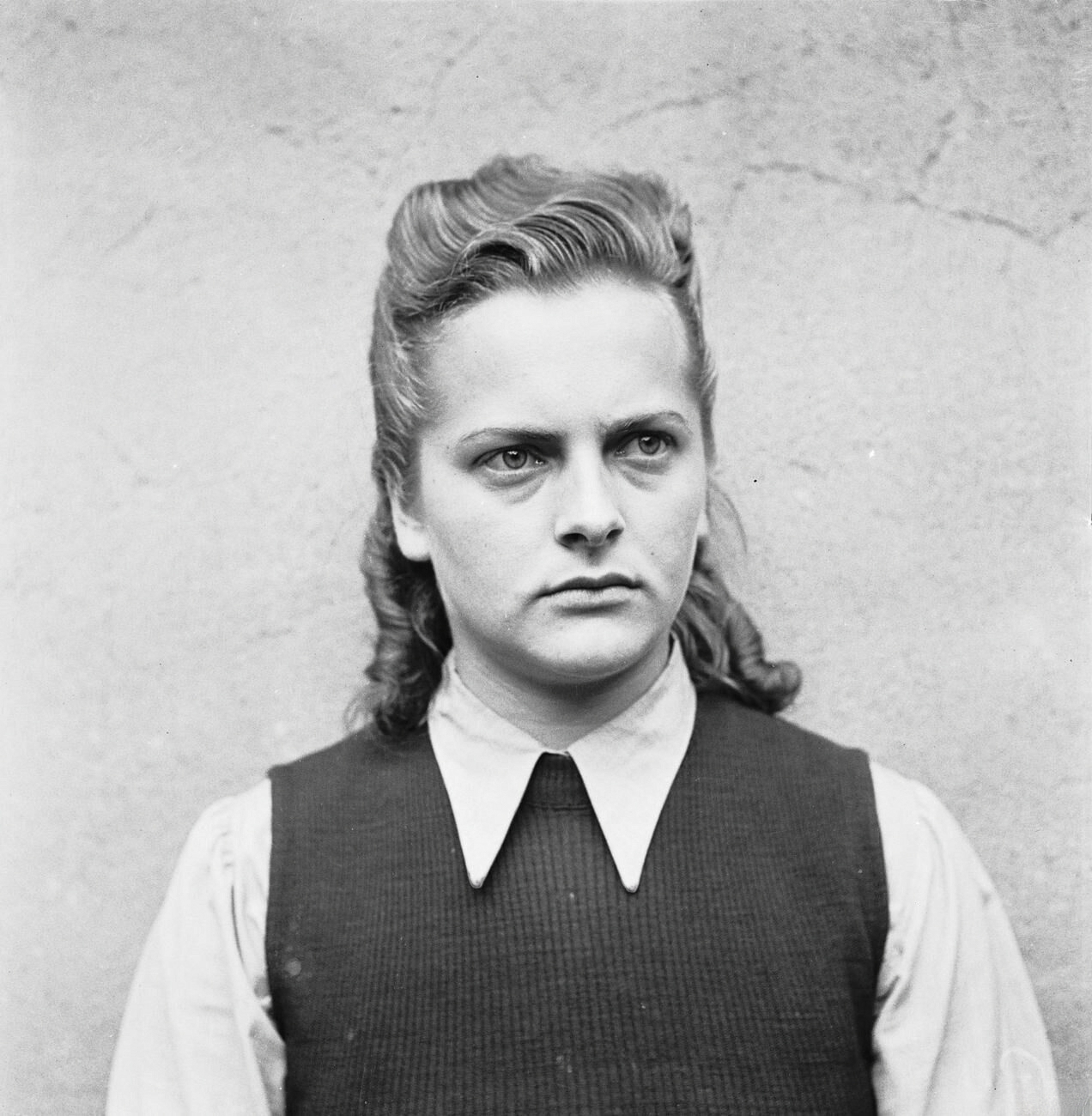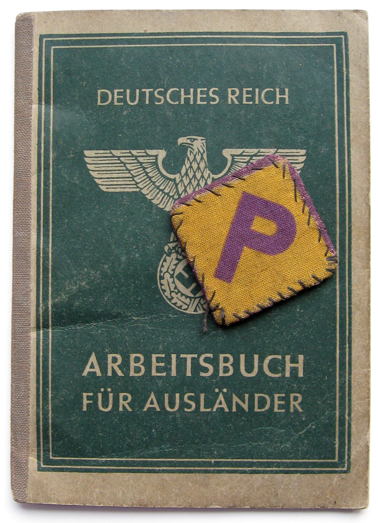|
Luise Danz
Luise Danz (11 December 1917 – 21 June 2009) was a Nazi concentration camps, Nazi concentration camp guard in World War II. She was born in Walldorf (Werra) in Thuringia. Danz was captured in 1945 and put on trial for crimes against humanity at the Auschwitz trial in Kraków, Poland. She was sentenced to life imprisonment in 1947, but released due to general amnesty on 20 August 1957. Camp work On January 24, 1943, at the age of 25, Danz was conscripted as an ''SS-Aufseherin'' within the Nazism, Nazi concentration camp system at Ravensbrück. She served as guard in several camps in occupied Poland, including Majdanek (1943-April 1944), Kraków-Płaszów (April 1944), Auschwitz-Birkenau (May 1944-January 1945) and Malchow concentration camp, Malchow (subcamp of Ravensbrück). In 1943, she received an award from Nazi Germany for her camp service. From 1 March 1943, she completed a three-week guard course at the Ravensbrück concentration camp and was on March 22, 1943 transferred ... [...More Info...] [...Related Items...] OR: [Wikipedia] [Google] [Baidu] |
Walldorf, Thuringia
Walldorf is a village and a former municipality the district of Schmalkalden-Meiningen in Thuringia, Germany. Since 1 January 2019, it is part of the town Meiningen. Its most notable sight is a fortress church A fortress church (german: Kirchenburg) is a particular type of church that, in addition to its religious functions is also used by the local population as a retreat and defensive position, similar to a refuge castle. A fortress church usually imp ..., ''Kirchenburg Walldorf'', in the middle of town on a hill. In April 2012 it was heavily damaged in a fire. References Former municipalities in Thuringia Schmalkalden-Meiningen Duchy of Saxe-Meiningen {{SchmalkaldenMeiningen-geo-stub ... [...More Info...] [...Related Items...] OR: [Wikipedia] [Google] [Baidu] |
Auschwitz Concentration Camp Personnel
Auschwitz concentration camp ( (); also or ) was a complex of over 40 concentration and extermination camps operated by Nazi Germany in occupied Poland (in a portion annexed into Germany in 1939) during World War II and the Holocaust. It consisted of Auschwitz I, the main camp (''Stammlager'') in Oświęcim; Auschwitz II-Birkenau, a concentration and extermination camp with gas chambers; Auschwitz III-Monowitz, a labor camp for the chemical conglomerate IG Farben; and dozens of subcamps. The camps became a major site of the Nazis' final solution to the Jewish question. After Germany sparked World War II by invading Poland in September 1939, the ''Schutzstaffel'' (SS) converted Auschwitz I, an army barracks, into a prisoner-of-war camp. The initial transport of political detainees to Auschwitz consisted almost solely of Poles for whom the camp was initially established. The bulk of inmates were Polish for the first two years. In May 1940, German criminals brought to the ... [...More Info...] [...Related Items...] OR: [Wikipedia] [Google] [Baidu] |
2009 Deaths
This is a list of deaths of notable people, organised by year. New deaths articles are added to their respective month (e.g., Deaths in ) and then linked here. 2022 2021 2020 2019 2018 2017 2016 2015 2014 2013 2012 2011 2010 2009 2008 2007 2006 2005 2004 2003 2002 2001 2000 1999 1998 1997 1996 1995 1994 1993 1992 1991 1990 1989 1988 1987 See also * Lists of deaths by day The following pages, corresponding to the Gregorian calendar, list the historical events, births, deaths, and holidays and observances of the specified day of the year: Footnotes See also * Leap year * List of calendars * List of non-standard ... * Deaths by year {{DEFAULTSORT:deaths by year ... [...More Info...] [...Related Items...] OR: [Wikipedia] [Google] [Baidu] |
1917 Births
Events Below, the events of World War I have the "WWI" prefix. January * January 9 – WWI – Battle of Rafa: The last substantial Ottoman Army garrison on the Sinai Peninsula is captured by the Egyptian Expeditionary Force's Desert Column. * January 10 – Imperial Trans-Antarctic Expedition: Seven survivors of the Ross Sea party were rescued after being stranded for several months. * January 11 – Unknown saboteurs set off the Kingsland Explosion at Kingsland (modern-day Lyndhurst, New Jersey), one of the events leading to United States involvement in WWI. * January 16 – The Danish West Indies is sold to the United States for $25 million. * January 22 – WWI: United States President Woodrow Wilson calls for "peace without victory" in Germany. * January 25 ** WWI: British armed merchantman is sunk by mines off Lough Swilly (Ireland), with the loss of 354 of the 475 aboard. ** An anti- prostitution drive in San Francisco occurs, and ... [...More Info...] [...Related Items...] OR: [Wikipedia] [Google] [Baidu] |
Female Guards In Nazi Concentration Camps
Aufseherin was the position title for a female guard in the Nazi concentration camps during World War II. Of the 50,000 guards who served in Nazi concentration camps, about 5,000 were women. In 1942, the first female guards arrived at Auschwitz and Majdanek from Ravensbrück. The year after, the Nazis began conscripting women because of a shortage of male guards. In the context of these camps, the German position title of ''Aufseherin'' translates to (female) "overseer" or "attendant". Later female guards were dispersed to Bolzano (1944–1945), Kaiserwald-Riga (1943–44), Mauthausen (March – May 1945), Stutthof (1942–1945), Vaivara (1943–1944), Vught (1943–1944), and at Nazi concentration camps, subcamps, work camps, detention camps and other posts. Recruitment Female guards were generally from the lower to middle class and had no relevant work experience; their occupational background varied: one source mentions former matrons, hairdressers, tramcar-conductresse ... [...More Info...] [...Related Items...] OR: [Wikipedia] [Google] [Baidu] |
Life Imprisonment
Life imprisonment is any sentence of imprisonment for a crime under which convicted people are to remain in prison for the rest of their natural lives or indefinitely until pardoned, paroled, or otherwise commuted to a fixed term. Crimes for which, in some countries, a person could receive this sentence include murder, torture, terrorism, child abuse resulting in death, rape, espionage, treason, drug trafficking, drug possession, human trafficking, severe fraud and financial crimes, aggravated criminal damage, arson, kidnapping, burglary, and robbery, piracy, aircraft hijacking, and genocide, crimes against humanity, war crimes or any three felonies in case of three-strikes law. Life imprisonment (as a maximum term) can also be imposed, in certain countries, for traffic offences causing death. Life imprisonment is not used in all countries; Portugal was the first country to abolish life imprisonment, in 1884. Where life imprisonment is a possible sentence, there may als ... [...More Info...] [...Related Items...] OR: [Wikipedia] [Google] [Baidu] |
German Camps In Occupied Poland During World War II
The German camps in occupied Poland during World War II were built by the Nazis between 1939 and 1945 throughout the territory of the Polish Republic, both in the areas annexed in 1939, and in the General Government formed by Nazi Germany in the central part of the country ''(see map)''. After the 1941 German attack on the Soviet Union, a much greater system of camps was established, including the world's only industrial extermination camps constructed specifically to carry out the "Final Solution to the Jewish Question". German-occupied Poland contained 457 camp complexes. Some of the major concentration and slave labour camps consisted of dozens of subsidiary camps scattered over a broad area. At the Gross-Rosen concentration camp, the number of subcamps was 97. The Auschwitz camp complex (Auschwitz I, Auschwitz II-Birkenau, and Auschwitz III-Monowitz) had 48 satellite camps; their detailed descriptions are provided by the Auschwitz-Birkenau State Museum. [...More Info...] [...Related Items...] OR: [Wikipedia] [Google] [Baidu] |
Auschwitz Trial
The Auschwitz trial began on November 24, 1947, in Kraków, when Poland's Supreme National Tribunal tried forty former staff of the Auschwitz concentration camps. The trials ended on December 22, 1947. The best-known defendants were Arthur Liebehenschel, former commandant; Maria Mandel, head of the Auschwitz women's camps; and SS-doctor Johann Kremer. Thirty-seven other SS officers—thirty-three men and four women—who had served as guards or doctors in the camps were also tried. Verdict of the Supreme National Tribunal in the first Auschwitz trial Rudolf Höss, sentenced in a previous trial, was executed on April 16, 1947, in front of the crematorium at Auschwitz I. The trial of camp commandant Höss, which took place at the Supreme National Tribunal in Warsaw throughout March 1947, was the first trial held at Auschwitz, followed by the trials in Kraków several months later. Summary The Supreme National Tribunal presiding in Kraków issued 23 death sentenc ... [...More Info...] [...Related Items...] OR: [Wikipedia] [Google] [Baidu] |
Poland
Poland, officially the Republic of Poland, is a country in Central Europe. It is divided into 16 administrative provinces called voivodeships, covering an area of . Poland has a population of over 38 million and is the fifth-most populous member state of the European Union. Warsaw is the nation's capital and largest metropolis. Other major cities include Kraków, Wrocław, Łódź, Poznań, Gdańsk, and Szczecin. Poland has a temperate transitional climate and its territory traverses the Central European Plain, extending from Baltic Sea in the north to Sudeten and Carpathian Mountains in the south. The longest Polish river is the Vistula, and Poland's highest point is Mount Rysy, situated in the Tatra mountain range of the Carpathians. The country is bordered by Lithuania and Russia to the northeast, Belarus and Ukraine to the east, Slovakia and the Czech Republic to the south, and Germany to the west. It also shares maritime boundaries with Denmark and Sweden. ... [...More Info...] [...Related Items...] OR: [Wikipedia] [Google] [Baidu] |
Lützow, Germany
Lützow is a municipality in the Nordwestmecklenburg district, in Mecklenburg-Vorpommern, Germany. It is close to the cities of Lübeck, Wismar and Schwerin Schwerin (; Mecklenburgisch dialect, Mecklenburgian Low German: ''Swerin''; Latin: ''Suerina'', ''Suerinum'') is the Capital city, capital and List of cities and towns in Germany, second-largest city of the northeastern States of Germany, German ... and is part of the Hamburg Metropolitan Region. References Nordwestmecklenburg {{Nordwestmecklenburg-geo-stub ... [...More Info...] [...Related Items...] OR: [Wikipedia] [Google] [Baidu] |
Luise Danz 1947
Louise or Luise may refer to: * Louise (given name) Arts Songs * "Louise" (Bonnie Tyler song), 2005 * "Louise" (The Human League song), 1984 * "Louise" (Jett Rebel song), 2013 * "Louise" (Maurice Chevalier song), 1929 *"Louise", by Clan of Xymox from the album ''Medusa'' *"Louise", by NOFX from the album ''Pump Up the Valuum'' * "Louise", by Paul Revere & the Raiders from '' The Spirit of '67'' * "Louise", by Paul Siebel from ''Woodsmoke and Oranges'', covered by several artists * "Louise", by Taylor Hawkins and the Coattail Riders from ''Taylor Hawkins and the Coattail Riders'' *"Louise", by The Yardbirds from the album ''Five Live Yardbirds'' Other * ''Louise'' (opera), an opera by Charpentier * ''Louise'' (1939 film), a French film based on the opera * ''Louise'' (2003 film), a Canadian animated short film by Anita Lebeau * ''Louise (Take 2)'', a 1998 French film * Louise Cake, part of New Zealand cuisine Royalty * Louise of Savoy (1476–1531), mother to Francis I ... [...More Info...] [...Related Items...] OR: [Wikipedia] [Google] [Baidu] |






